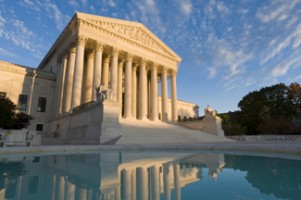Lawyer's failure to object to closed jury selection doesn't require new trial, SCOTUS rules

Shutterstock
A murder defendant is not entitled to a new trial, even though his lawyer failed to object to closing the courtroom during jury selection, the U.S. Supreme Court has ruled.
The court rejected an ineffective assistance claim by Kentel Myrone Weaver because he failed to show that a jury would have acquitted him if his lawyer had raised the objection.
Weaver’s mother and minister were excluded from jury selection when the courtroom was closed. His trial lawyer believed the closure was constitutional, and he didn’t discuss the matter with Weaver and didn’t raise an objection.
Weaver “has not shown a reasonable probability of a different outcome but for counsel’s failure to object, and he has not shown that counsel’s shortcomings led to a fundamentally unfair trial,” Justice Anthony M. Kennedy wrote in the majority opinion.
Kennedy’s opinion was joined in full by Chief Justice John G. Roberts Jr. and Justices Clarence Thomas, Ruther Bader Ginsburg, Sonia Sotomayor and Neil Gorsuch.
The case involves the intertwining of two doctrines: structural error and ineffective assistance of counsel, Kennedy said.
Weaver did not raise the closed-trial issue on direct review, but asserted it later in a claim for ineffective assistance of counsel.
Violation of the right to a public trial is a structural error, Kennedy said. When there is an objection at trial to such an error, and it is raised on direct appeal, the defendant is usually entitled to an automatic reversal.
Because the issue was raised in a later ineffective assistance claim, the defendant had to show that his lawyer’s error was so serious that it violated the right to counsel, and that the error prejudiced the defense, Kennedy said. And Weaver was not able to meet that standard.
“In the criminal justice system, the constant, indeed unending, duty of the judiciary is to seek and to find the proper balance between the necessity for fair and just trials and the importance of finality of judgments,” Kennedy wrote. “When a structural error is preserved and raised on direct review, the balance is in the defendant’s favor, and a new trial generally will be granted as a matter of right. When a structural error is raised in the context of an ineffective-assistance claim, however, finality concerns are far more pronounced.”
Justice Thomas wrote a concurring opinion, and Justice Samuel Anthony Alito Jr. wrote an opinion concurring in the judgment. Gorsuch joined both of those opinions.
Justice Stephen G. Breyer dissented in an opinion joined by Justice Elena Kagan. He argued that a defendant who shows a structural error should not have to show it would have changed the outcome of the trial.
The case is Weaver v. Massachusetts.



